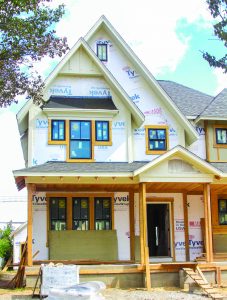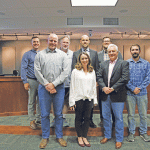Data reveals Colorado’s cities and towns face housing challenges
Special to the Surveyor
This year, the Colorado Municipal League (CML) released its 10th edition of the State of Our Cities & Towns report. The survey asked municipalities to look back at the challenges they encountered in the aftermath of the Great Recession and the successes they have had in the face of this adversity. CML also asked its members to identify the emerging issues they see on the horizon and the opportunities they have to address them.
One enduring challenge stood out: Housing. Twenty-six percent of respondents answered that it was “somewhat worse” than 10 years ago, and 17 percent stated it was “much worse.” Only 3  percent said that it was “much better.” Focusing in on the past three years alone, not a single municipality responded that housing had gotten “much better,” and 56 percent selected “somewhat worse” or “much worse.”
percent said that it was “much better.” Focusing in on the past three years alone, not a single municipality responded that housing had gotten “much better,” and 56 percent selected “somewhat worse” or “much worse.”
Even these numbers, however, fail to fully encapsulate the concern felt by public officials around the state about the lack of affordable housing options in their communities. Respondents described the supply of housing as “insufficient,” “unattainable,” or “in disrepair,” while they described the need as “critical,” “significant,” and “desperate.” Overall, as one municipality reported, the picture is “bleak.”
Given the severity of the housing crisis, it is not only starter homes that some communities are struggling to provide. Municipalities from the Front Range to the Eastern Plans mentioned the need for housing throughout the price spectrum. Multiple respondents lamented the high cost of water, shortage of skilled labor, and proliferation of short-term rentals exacerbating the issue. In addition, community response to municipal attempts to address the concern has ranged from tepid acceptance to vehement opposition.
The problem is not limited to the Front Range. Mountain communities have watched housing costs rise out of reach of the workforce on whom their tourism-based economies rely, and these soaring prices affect the rental housing stock as well as homes for purchase. Rural cities and towns have reported difficulty attracting developers willing to build in their area even as the demand is growing, and many existing homes have been neglected or abandoned.
A lack of affordable housing options has cascading effects. In one Front Range community, for example, fewer than 5 percent of City employees live in the City simply because they cannot afford to do so. Their commutes increase traffic congestion and pollution. In addition to these more visible impacts, a workforce that is forced to commute can make individuals feel like outsiders to the very community they serve, interfering with the neighborly interactions that can make a city or town feel like home. An inability to provide workforce housing also may lead to challenges recruiting and retaining workers in all sectors, which is already being felt by 53 percent of respondents. Ultimately, housing challenges can contribute to slower economic growth, as reported by 40 percent of respondents.
The increase in housing costs also has had a noticeable impact on the number of homeless individuals within communities around the state. While only 20 percent of respondents reported an increase in homelessness directly connected to affordable housing challenges, 37 percent reported an increase in homelessness in the past three years due to any factors, with that number skyrocketing to 95 percent in municipalities with a population greater than 25,000. This increase has left municipalities struggling to find enough resources to provide services for homeless individuals.
In the face of these challenges, municipal leaders are taking action. Forty-two percent of respondents either currently have a housing affordability plan or plan to create one in the next three years, and 61 percent work with a local or regional housing authority. Cities and towns are fast-tracking land use applications and waiving permit fees on affordable housing projects, zoning for tiny homes, and entering into agreements with developers to place deed restrictions on certain properties.
CML also has committed to facing the housing crisis head-on as part of our commitment to serving the cities and towns of Colorado. The 2019 State of Our Cities & Towns survey provided the data to confirm what we already believed: Cities and towns need support on this topic. Earlier this month, CML released a magazine dedicated to affordable housing, produced a podcast on homelessness, and created a video spotlighting a mixed-income housing project in the City of Wheat Ridge. Complete survey results and resources can be found at www.cml.org/state-of.
CML is a non-profit, non-partisan organization established in 1923 and represents the interests of 270 cities and towns. For more information on the Colorado Municipal League, please visit www.cml.org or call 303-831-6411.
- June, 02 2016

TMS eighth-graders look back
Taitlyn Harrigfeld shares her memories of TMS during her year-end presentation.Photo...
- November, 30 2017

Two housing developments progress and...
By Amber McIver-Traywick The Surveyor As the year draws to a close the town board...
- June, 21 2019

PoliceFiles
Monday, June 10 Neighbor problems: Sixth Street Court, a woman was called in after she...
- May, 20 2021

News Bites – May 20, 2021
Total Cases: 26,566 (+826 from last week) Total Cases in Berthoud: 1,196 (+38 from last...
- November, 02 2023

Grace Place seeks mentors for Berthou...
By Shelley Widhalm The Surveyor Grace Place expects to need at least 15 church and...
- September, 15 2022

Summer flavors shine in this fresh to...
Photo by David Tisue - Tomato galette shines with fresh seasonal...

Unified basketball comes to Turner Middle School
Community News

Mike Grace says goodbye as Brett Wing joins town board
Community News
POLICEBLOTTER
Community News
Northern Water sets C-BT quota at 70% for 2024
Community News

Emotions run high during Revere Property hearing
Community News
Snowpack at 119% above normal
Community News

Karspeck to serve third term as Berthoud mayor
Community News
COMMUNITY CALENDAR:
Community Calendar – add an event
Homestead Fine Art Gallery First Fridays OPEN HOUSE
03 May 4:00 PM - 7:00 PM
Homestead Fine Art Gallery First Fridays OPEN HOUSE
07 Jun 4:00 PM - 7:00 PM
Homestead Fine Art Gallery First Fridays OPEN HOUSE
05 Jul 4:00 PM - 7:00 PM
Homestead Fine Art Gallery First Fridays OPEN HOUSE
02 Aug 4:00 PM - 7:00 PM
Homestead Fine Art Gallery First Fridays OPEN HOUSE
06 Sep 4:00 PM - 7:00 PM
Homestead Fine Art Gallery First Fridays OPEN HOUSE
04 Oct 4:00 PM - 7:00 PM

